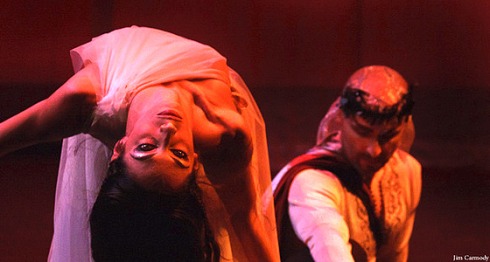A dazzling image emerges from Scarlet Stone, UCSD composer Shahrokh Yadegari’s fusion of music, dance, poetry, and interactive electronics. A long haired young man stands still, arms at his sides, as he is being slowly wrapped from the feet up in sheets of scarlet silk. The cloth flows from a bolt held by a woman in filmy black who declaims sonorous poetic cadences as she circles and immobilizes the anguished-faced youth.
In the ancient Persian story being told in Scarlet Stone, the young man, Sohrab—danced by Yadegari’s collaborator, French-Iranian choreographer Shahrokh Moshkin-Ghalam—is dying from a wound inflicted by his father. But another tale is being spun as well. In Yadegari’s version—based on a poem by the 20th century Iranian writer Siavash Kasrai and performed by members of the contemporary Iranian diaspora—storytellers and their subjects are engaged in a continuous dance. A hero is wrapped in the fabric of one era only to be set free to illuminate another—an image brought alive by the buoyant unfurling of the silk as Moshkin-Ghalam, left alone on the stage, whirls and whirls.
Like stories and storytellers, politics and culture are the warp and weft of Scarlet Stone. The story of Sohrab and his father Rostam was first written in Shahnameh (Tale of Kings) by the poet Ferdowsi at the end of the ninth century. Muslims had successfully invaded the kingdom of Persia two centuries earlier, and Arabic had become the dominant language. In collecting and turning into verse the tales of fifty mythic and historic kings of Persia—an enterprise that took Ferdowsi more than thirty years—he succeeded not only in creating a national epic, but in preserving the Persian language for continuing generations.
In Ferdowsi’s telling, the hero-king Rostam is wooed and seduced by the daughter of a neighboring king. She intends that their child be a force to bring their peoples together, but events conspire to separate the lovers. In time her son grows into a great warrior and is sent to battle against Rostam. The father does not recognize his son, and Sohrab receives a fatal blow
Poet Siavash Kasrai was born in 1927, two years after the Pahlevi regime took power. A leftist, he welcomed the end of the shah’s rule in 1979 but later was driven to leave the country. Mohre-ye Sorkh (Scarlet Stone), was the last poem Kasrai wrote before dying in Vienna in 1996. In his version of the ancient story, Sohrab confronts the poet Ferdowsi, demanding to know why his murderer-father seems to be the hero of the tale and what meaning his own death has in the face of his and his mother’s hopes of peace and brotherhood.
For Yadegari, Kasrai’s poem remains a pertinent commentary on present events. Writing about his own Scarlet Stone which has been in production since the 2009 uprising in Iran, he notes: “For many years, the only option for defining a structural basis for a social or political movement was either leaning towards the left or the right. We feel the current movements in Iran, where all sections of people have come together to voice their desire for peaceful reform and freedom, are a living example of what Kasrai has presented in this work.”
One striking portrayal of changes that have already come: The roles of Ferdowsi and that of a modern storyteller in Yadegari’s production are both played by a woman, Fatemeh Habibizad (a.k.a. Gordafarid). Habibizad is recognized as modern Iran’s first female Naqqal, the name given to the professional storytellers who have, in the centuries following Ferdowsi’s writing of Shahnameh, recited its tales to rapt audiences in king’s courts and village coffeehouses—the latter, especially, a traditional male preserve.
When Habibizad as Ferdowsi in Scarlet Stone tells Sohrab that he is both responsible for his own fate and a hero to others, a story begun with the ancient oral traditions that were Ferdowsi’s sources, and shaped for the needs of fresh audiences by generations of Naqqali and poets, spirals up and outward like the scarlet silk on the performance stage. An unbroken line in a new figure.
###
Ariel Swartley
San Pedro, CA
aswartley@att.net



Leave a comment